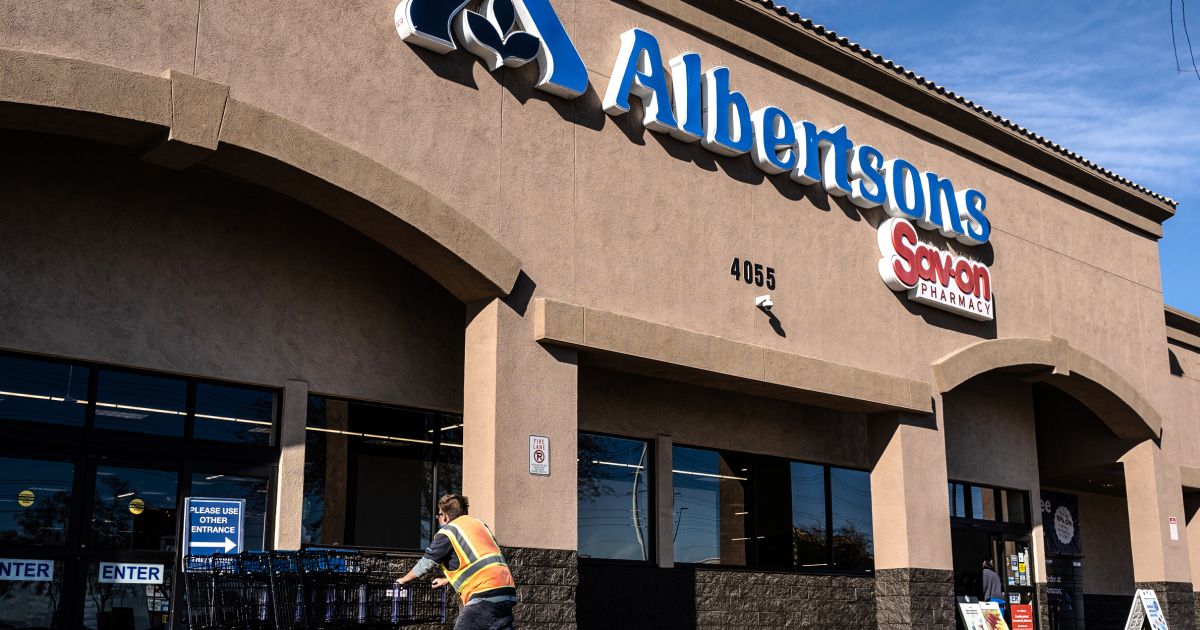Two Democratic lawmakers are urging an investigation of grocery stores that they say might be overcharging customers.
Sen. Elizabeth Warren, D-Mass., and Rep. Adam Schiff, D-Calif., sent a letter, seen by NBC News, to the Federal Trade Commission and the Department of Agriculture on Sunday, calling on the agencies to investigate whether “major grocery chains may be making false and misleading representations regarding food sold by weight, leading to customers paying more for groceries than expected.”
Both lawmakers come from overwhelmingly Democratic states and are on the ballot this year. Warren is favored to win re-election, and Schiff, currently a high-ranking House member, is ahead in his bid to become California’s junior senator.
Their move in the election’s home stretch isn’t likely to spark any near-term government action, especially not if Republicans regain the White House. It follows numerous efforts by the Biden-Harris administration to pressure grocery sellers to lower prices, and plans by Vice President Kamala Harris to curb excessive food price hikes if elected. She and former President Donald Trump have each sought to persuade voters that they’re focused on tackling living costs in an election where affordability is top of mind.
The letter refers to a lawsuit in which California prosecutors alleged Albertsons and its subsidiaries Safeway and Vons “unlawfully charged customers prices higher than their lowest advertised or posted price” and mislabeled items sold by weight, including produce, meat and baked goods.
The suit was settled in early October for $4 million, with Albertsons denying wrongdoing, but Warren and Schiff said they believe the potential for “similar predatory pricing practices nationwide” deserves further scrutiny.
“Too frequently, large grocery companies use their significant market power to hike prices for essential goods and take advantage of customers,” the letter said. Four other senators and 10 additional representatives — all Democrats, plus Sen. Bernie Sanders, I-Vt. — also signed on to it.
Albertsons, the FTC and the USDA didn’t immediately respond to requests for comment.
Warren has previously accused grocery chains of taking advantage of shoppers, saying at a Senate hearing in May that “grocery prices are up because of good old-fashioned corporate price gouging,” which she attributed to a “small number of companies controlling every level of the food chain.”
In Sunday’s letter, she and Schiff said Albertsons may have violated federal law, citing “unfair or deceptive acts or practices” prohibited by the Federal Trade Commission Act. They said the company may also have neglected to disclose the appropriate quantities in certain products, as required by the Fair Packaging and Labeling Act.
After the California settlement, Albertsons said it was committed to its price accuracy guarantee and would post signs and conduct additional training to “better ensure real-time accuracy in stores.” The pricing dispute isn’t the first of Albertsons’ troubles this year. In February, the FTC sued grocery giant Kroger to block its acquisition of Albertsons, which the agency said would “eliminate competition and raise grocery prices for millions of Americans.”
The Biden-Harris administration has argued the proposed merger would reduce competition, drive up costs for consumers and pressure down grocery workers’ wages. The companies counter that a tie-up would have the opposite effect, allowing them to better compete with rivals like Walmart, Amazon and Costco. Kroger vowed this summer to lower prices by $1 billion after the deal closes, if it is permitted to go forward.
Food prices have been among the biggest pain points for households during the latest bout of inflation. Grocery prices shot up 20% between January 2021 and December 2022, causing some consumers to cut back on common purchases like red meat and eggs. But inflation is now virtually back to normal; since November 2023, grocery prices have been increasing by less than 2% on an annual basis.
Even so, many people still feel they’re living in an inflationary era, a recent Bank of America study found. While average hourly wage gains are outpacing inflation, many people are living paycheck to paycheck and spending a large chunk of income on necessities.
Concerns about potential price gouging in supermarkets — including at Kroger and Walmart — have also been fueled by the rise of electronic price tags on store shelves and the “dynamic pricing” they could enable. The companies say the tags let employees change prices up to every 10 seconds, allowing them to streamline operations and restock faster.
But Warren and Schiff, whose letter also addressed that technology at Kroger, said it “may allow the company to surge grocery prices and exploit consumers,” a concern Warren also raised in a letter to the chain’s CEO in August.
Kroger has denied that claim, saying electronic pricing would only be used to lower prices whenever possible.

